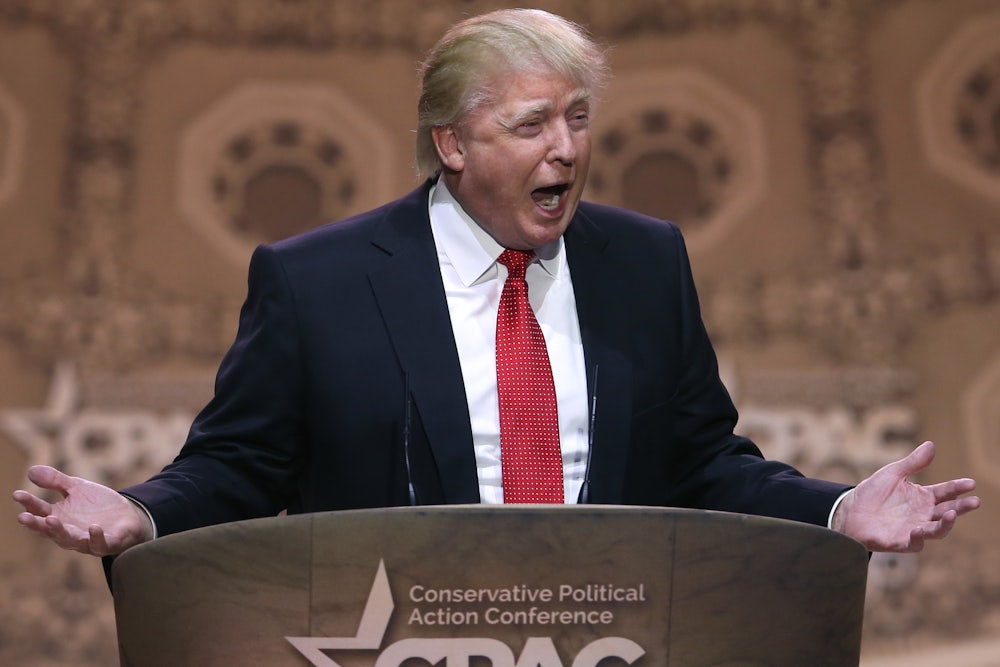If you’ve been following Donald Trump’s presidential candidacy and his effect on the Republican primary closely, you were perhaps beset Monday by a strange sense of speechlessness—one born less of ineffability than of tedium.
Trump’s plan to prohibit Muslim immigration into the U.S. is indeed extreme, but to students of the Trump phenomenon and conservative politics more broadly, it was neither unexpected nor the source of any new or profound lesson.
While closing the country to foreign Muslims altogether is a radical idea relative to our founding ideals and current policy, it is but an incremental step relative to the outer bounds of legitimate debate in the GOP primary. Republican presidential candidates have supported discriminating against Muslims in our refugee policy, and opposed the very notion of a Muslim-American president, all without subjecting themselves to universal condemnation. The most surprising part of the latest Trump story is that it proves a Republican candidate can take Islamophobia too far for his party’s tastes.
For most liberals, and for the Trump-backing or Trump-curious segments of the right, the Trump phenomenon needs little further explanation. The only people who claim to be befuddled by the Trump phenomenon are officials on knife-edge in the party he leads.
On the left, the view that Republicans allowed the conservative grassroots to turn their party into a political action committee for white ressentiment has evolved over the years from an argument into a creed. Since at least 2012, liberals have been warning (at times mockingly, but never disingenuously) that by indulging and at times fanning the hostilities and procedural extremism of this part of their coalition, Republicans were letting expediency get the better of them.
When large swaths of the conservative movement resisted the notion that the GOP needed to widen its appeal to minorities, and could win by appealing to a broader base of whites, it was liberals who warned that these voters would drag the party into a racial abyss.
Trump is the fulfillment of that prophecy. Better than any Republican candidate in recent memory, he intuits the mood of the disaffected Republican electorate. Or rather, because he’s almost entirely uninterested in straddling party factions, he gives voice to their paranoia and racism without massaging it the way the pretenders to his lead do. It’s possible to imagine a more traditional politician, like Ted Cruz, taking up Trump’s mantle without ever making Reince Priebus or House Speaker Paul Ryan angry, but their platforms would look practically identical.
This is the main reason GOP protestations, five months after Trump reached the top of the polls, ring so hollow. Republicans behave as if Trump is both a self-contained phenomenon and a singular mouthpiece for the most important segment of their electorate. An unmetastasized malignancy and a vital organ, simultaneously. The former view serves to reassure the rest of the public (and GOP donors among them) that Trump is merely a passing fad—an unlovely figurehead for a perfectly lovely segment of the voting base. That once he’s gone, everything will return to normal.
But the former view is also facially incompatible with the latter. It’s why their condemnations of Trump are either half-hearted, or paired with some alternate, less overtly discrediting appeal to his fans. The modus operandi of second-tier candidates has been to tiptoe around Trump’s controversies, rather than create contrast with them. Even Ryan, who denounced Trump’s Monday comments in the most unambiguous terms, still pledged to support him should he win the Republican nomination.
The Republican National Committee developed its candidate pledge as a way to hem Trump in. The pledge has evolved into a symbol of the party’s commitment to keeping Trump’s fans in the fold. If Trump were to vanish suddenly, his supporters would either defect to an alternate poll leader over whom the party could better exert control, or else the remaining candidates would enter a race to the bottom to win their support.
And yet, while there’s something novel and fascinating about the pageant—the Republican House speaker rebuking his party’s presidential frontrunner; the fraying ties between Trumpistas and the rest of the party—the nature of the crisis is totally mundane to liberals. So common is it on the left to compare the Trump phenomenon (and the Sarah Palin phenomenon before it) to a Frankenstein’s monster, that the analysis has become trite.
To really shake things up—to raise new questions and provoke new thinking about conservative politics—the Republican Party would have to do something drastic like rescind the loyalty pledge as it pertains to Trump. Unless and until that happens, Trump is likely to continue shoring up support on the basis of increasingly grotesque views, and leave those of us who’ve been clear-eyed about it all along with nothing much to add.
